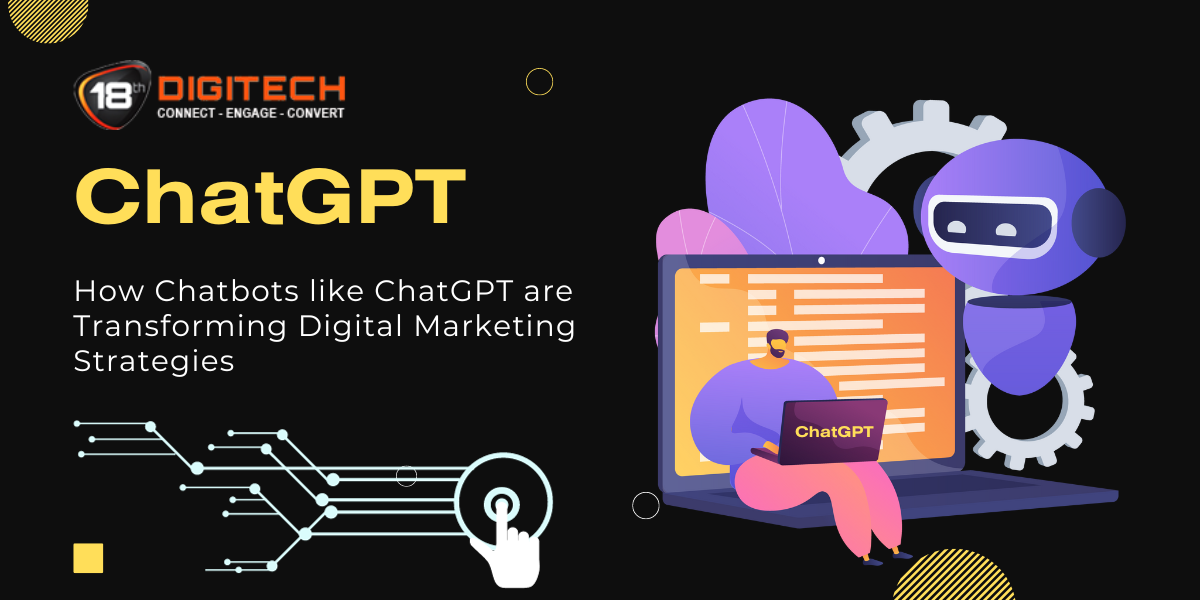In today’s world of digital marketing, businesses are constantly seeking innovative ways to engage and connect with their customers. One of the most transformative technologies in recent years is the advent of chatbots, and ChatGPT is a prime example of how these virtual assistants are reshaping digital marketing strategies.
In this blog, we will explore the profound impact chatbots are having on the marketing industry and how they are revolutionising the way businesses interact with their audience.
ChatGPT: Overview
ChatGPT is an advanced natural language processing model developed by OpenAI. It’s a part of the GPT (Generative Pre-trained Transformer) series of models and is specifically designed for engaging in text-based conversations, making it a versatile tool for various applications involving human-computer interactions.
- GPT-3: The history of ChatGPT is closely tied to the development of the GPT series. The first significant model in this series was GPT-3, released in June 2020. GPT-3 was a groundbreaking language model known for its ability to generate coherent and contextually relevant text. It had 175 billion parameters, making it one of the largest and most powerful models at the time.
- OpenAI’s Mission: OpenAI, the organisation behind ChatGPT, has a mission to ensure that artificial general intelligence (AGI) benefits all of humanity. They are focused on developing AI models that are not only state-of-the-art but also safe, ethical, and accessible.
- Transformative Potential: The development of models like GPT-3 laid the foundation for the realisation of AI’s transformative potential in various domains; including natural language understanding, content generation, and conversational AI.
- ChatGPT’s Emergence: ChatGPT can be considered an evolution of the GPT-3 model, with a specific focus on enabling meaningful and coherent text-based conversations. It was designed to maintain context during interactions, understand conversational nuances, and provide detailed responses. It represents a step toward creating AI systems that can be utilised for more engaging and practical conversational applications.
- Public and Research Access: OpenAI initially released GPT-3 and ChatGPT models to the research community and as part of its API, allowing developers and researchers to explore their capabilities, providing valuable feedback, and helping refine the models.
- Ethical Considerations: Throughout the development of ChatGPT and GPT-3, OpenAI has actively addressed ethical concerns surrounding AI, including biases in responses and potential misuse. They have implemented guidelines and rules for responsible AI usage and are working to reduce biases in AI-generated content.
- Continued Research and Improvement: OpenAI continues to invest in research and development to improve the capabilities, safety, and ethical considerations of models like ChatGPT. They have been actively soliciting feedback from users and the research community to refine and enhance their models.
- Applications and Use Cases: ChatGPT has found applications in content generation, customer support, education, coding assistance, language translation, and more. Its versatility and adaptability have made it a valuable tool for a wide range of industries and purposes.
Impact of ChatGPT on Marketing
ChatGPT, as a sophisticated conversational AI model, has had a profound impact on the field of marketing. It has transformed the way businesses engage with their audience and execute their marketing strategies in several significant ways:
- Enhanced Customer Engagement: ChatGPT has redefined customer engagement by providing businesses with a tool that can interact with customers 24/7. Its ability to deliver instant and personalised responses keeps customers engaged and interested in a brand’s products or services. This round-the-clock availability ensures that businesses can capture leads and engage with customers at any time.
- Personalisation at Scale: ChatGPT leverages its natural language understanding and large knowledge base to offer personalised recommendations. By analysing user data and behaviour, it can suggest products, services, or content that align with individual preferences. This level of personalisation significantly boosts conversion rates and drives more targeted marketing campaigns.
- Lead Generation and Qualification: ChatGPT can actively assist with lead generation and qualification. It can initiate conversations with the website visitors, collect contact information, and qualify leads based on predefined criteria. This streamlines the sales process, ensuring that sales teams receive high-quality leads, ultimately saving time and resources.
- Efficient Customer Support: The model’s conversational abilities have made it a valuable asset for improving customer support. It can handle a wide range of customer queries and issues, freeing up human agents to focus on more complex tasks. This results in faster response times and improved customer satisfaction, which is crucial for retaining customers and building brand loyalty.
- Cost Efficiency: ChatGPT offers a cost-effective alternative to hiring and training additional customer support staff. Once integrated, chatbots can manage multiple customer interactions simultaneously, reducing labour costs while maintaining or even improving service quality.
- Data Collection and Analysis: ChatGPT can collect valuable user data during interactions. This data can be used for analysing customer behaviour, preferences, and pain points. This information is invaluable for tailoring marketing strategies, developing new products or services, and improving overall customer experiences.
- Multi-Channel Integration: ChatGPT is versatile and can be integrated into various platforms, including websites, social media, messaging apps, and email. This flexibility ensures that businesses can reach and engage with their audience wherever they are, providing a consistent brand experience.
- Continuous Improvement: ChatGPT is constantly learning and evolving. With the ability to gather data and user feedback, it can adapt and improve its responses over time, leading to more effective customer interactions.
Chatbots in Digital Marketing
Chatbots are AI-driven virtual assistants designed to engage in text-based conversations with users, providing real-time responses and assistance. They have a significant impact on various aspects of digital marketing:
Enhanced Customer Engagement
- Chatbots offer a 24/7 online presence, enabling businesses to engage with customers at any time.
- They provide instant responses to inquiries, improving user experience and keeping visitors on websites or social media pages longer.
Personalisation and Recommendations
- Chatbots can analyse user data and behaviour to provide personalised product recommendations or content suggestions.
- Personalisation leads to higher conversion rates and customer satisfaction.
Lead Generation and Qualification
- Chatbots can initiate conversations with website visitors, collect contact information, and qualify leads based on predefined criteria.
- They streamline the lead generation process, saving time and resources.
Customer Support and Service
- Chatbots handle routine customer queries, providing quick and consistent responses.
- They free up human agents to focus on more complex issues, improving customer service and response times.
Cost Efficiency
- Deploying chatbots is often more cost-effective than hiring and training additional customer support staff.
- Chatbots can manage multiple customer interactions simultaneously, reducing labour costs.
Data Collection and Analysis
- Chatbots collect valuable user data during interactions, including preferences, behaviour, and pain points.
- This data can inform marketing strategies, product development, and customer segmentation.
Multi-Channel Integration
- Chatbots can be integrated into various digital marketing channels, such as websites, messaging apps, and social media.
- This ensures a consistent brand experience across different platforms.
Continuous Improvement
- Chatbots learn and adapt over time based on the data and feedback they receive.
- This leads to increasingly effective interactions and better user experiences.
Automated Marketing Campaigns
- Chatbots can be programmed to send automated marketing messages, such as promotional offers or follow-up messages to leads.
- This automates part of the marketing funnel and ensures timely communication with customers.
Surveys and Feedback Collection
- Chatbots can be used to conduct surveys and collect customer feedback, helping businesses make data-driven decisions and improve their products or services.
ChatGPT and Digital Marketing Transformation
ChatGPT has played a pivotal role in the transformation of digital marketing. With its advanced natural language understanding and conversation capabilities, ChatGPT has enabled businesses to engage with their audience in a more personalised and efficient manner. It has redefined customer interactions by offering 24/7 availability, instant responses, and personalised recommendations. Furthermore, ChatGPT facilitates lead generation and qualification, automates customer support, and collects valuable data for data-driven marketing strategies. Its versatility in multi-channel integration and continuous learning makes it a valuable asset for digital marketers, revolutionising the way they connect with and cater to their customers. In an era where customer engagement and personalisation are paramount, ChatGPT has emerged as a vital tool in the digital marketing toolkit, driving the industry’s transformation towards more effective and customer-centric strategies.
Optimising Digital Marketing with ChatGPT
Here’s how ChatGPT can optimise digital marketing efforts:
Personalised Content Generation
- ChatGPT can assist in generating personalised content for blogs, social media, email campaigns, and more.
- By understanding user preferences and behaviour, it can tailor content to individual audience segments, boosting engagement and conversion rates.
Customer Support Automation
- ChatGPT can automate routine customer support tasks, providing instant responses to common queries.
- This not only improves response times but also ensures consistent and accurate information, enhancing the customer experience.
Lead Qualification and Nurturing
- ChatGPT can initiate conversations with website visitors, collect lead information, and qualify prospects based on predefined criteria.
- It streamlines the lead generation process, helping businesses identify high-potential leads and nurture them effectively.
Multilingual Marketing
- ChatGPT’s multilingual capabilities enable businesses to reach a global audience with localised content.
- This is invaluable for international marketing efforts, expanding the brand’s reach and impact.
Content Recommendations
- ChatGPT can analyse user behaviour to offer personalised content recommendations, such as products, articles, or services.
- This increases user engagement and encourages longer interactions with your digital platforms.
Data-Driven Insights
- ChatGPT collects valuable user data during interactions, providing insights into user behaviour, preferences, and pain points.
- Marketers can use this data for data-driven decision-making, refining marketing strategies, and optimising customer journeys.
Creative Assistance
- ChatGPT can aid in brainstorming and generating creative ideas for marketing campaigns.
- It’s a valuable tool for content creators and marketers seeking fresh and innovative approaches to captivate their audience.
Scalable Marketing Campaigns
- ChatGPT can be used to automate aspects of marketing campaigns, including email outreach and social media posting.
- This scalability frees up marketing teams to focus on strategy and creative aspects of their campaigns.
Speedy Response to Trends
- ChatGPT can quickly analyse and provide information on emerging trends or news topics.
- This is particularly useful for real-time marketing strategies, ensuring that businesses stay relevant in rapidly changing environments.
Continuous Learning and Improvement
- ChatGPT continually learns from user interactions and feedback, enhancing its responses over time.
- This ensures that marketing efforts are always adapting to the evolving needs and preferences of the audience.
Wrapping Up,
The rise of chatbots, exemplified by ChatGPT, is dramatically transforming digital marketing strategies. These AI-driven virtual assistants are enhancing customer engagement, personalisation, lead generation, and customer support while offering cost-efficiency and data-driven insights. As technology continues to advance, chatbots are poised to play an even more prominent role in the future of digital marketing, enabling businesses to build stronger relationships with their customers and drive sustainable growth. Embracing chatbot technology today is not just an option but a strategic necessity for staying competitive in the digital marketing landscape.
To gain more insight on how chatbots are transforming digital marketing strategies, get in touch with us at 18th DigiTech.








 About 18th Digitech
About 18th Digitech Awards and Credentials
Awards and Credentials Our Partners
Our Partners Press/Events
Press/Events
